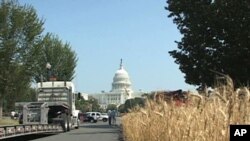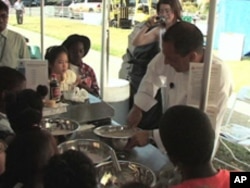For two days this fall, a wheat field grew in Washington, D.C.
It was part of an effort by wheat farmers and food makers' trade groups to educate Americans on where their food comes from.
But some saw it as a public-relations move to counter popular movies and books that blame farmers for damaging the environment and endangering health.
On a closed-off street at the foot of Capitol Hill, workers hauled in containers with wheat plants in each stage of the life cycle — from grassy young sprouts to green-headed shoots to amber waves of grain ready for harvest. The mobile wheat field filled about quarter-block of a D.C. street.
Farm-to-fork
There was a grain mill that grinds the wheat into flour. There were supermarket shelves full of bread, cereal, and other wheat foods. And a chef was on hand to show visiting groups of schoolkids how wheat becomes cupcakes.
The idea of a two-day wheat field was a bit puzzling to Hearst Elementary School fifth grader Alyssa Campbell.
"I was, like, 'That's impossible! Wheat fields are in the ground!' And so I was really wondering how wheat fields could move, because they're not alive and they don't have legs."
School groups came for a fun field trip. But the event carried a serious message, said Jerry McReynolds, a Kansas wheat farmer and president of the National Association of Wheat Growers. He said the exhibit is important because Americans don't know enough about where their food comes from.
"All we can do is give some education and try to help them understand that it's a process. It doesn't just happen. You don't just go to the store and it's magically there," he said.
Educating lawmakers
According to McReynolds, school children are not the only ones who need a lesson on where their food comes from. Policymakers writing environmental regulations have lost track, too, he said.
"We wouldn't do anything to harm the environment," McReynolds noted, "but when there's undue regulations that cost us either financially, or makes it impossible to meet those regulations — that may have to do with water, or dust, or spray or any of those types of things — it just drives agriculture away."
He said if lawmakers and regulators understood agriculture better, they would not make rules that threaten American farmers' ability to raise food for the nation and the world.
Overblown
But environmentalists say farmers' complaints about over-regulation are overblown.
For example, "They have exemptions under the Clean Water Act," said Don Carr, a spokesman for the non-profit Environmental Working Group. "Agriculture is the biggest contributor to the dead zone in the Gulf of Mexico — you've got all this farm runoff that's coming from the Mississippi River basin. That's not regulated."
Carr said events like this one are the farmers' response to popular movies such as "Food, Inc." and books including "The Omnivore's Dilemma" that criticize their practices.
He added that not everyone who learns more about modern food production comes to the same conclusion.
"The more they learn about some of the environmental perils of some of the agricultural practices that we engage in, the more they've made their voices heard, which makes these [public relations] campaigns needed by the big growers," he said.
And while fifth grader Alyssa Campell is too young to vote, her father is not. The fate of rules and regulations governing how farmers raise our food and protect our environment rest in the hands of his elected officials — just up the street on Capitol Hill.






